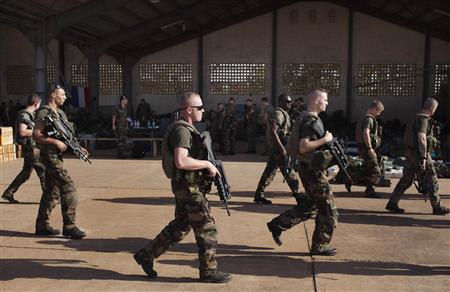
France
has already poured hundreds of troops into Mali and carried out days of
air strikes in a vast desert area seized last year by an Islamist
alliance that combines al Qaeda's north African wing AQIM with Mali's home-grown MUJWA and Ansar Dine rebel groups.
Western and
regional powers are concerned the insurgents will use Mali's north as a
launchpad for international attacks.
"On January 15, the committee of Chiefs of Defense Staff will meet in Bamako
to approve the contingency plan," the mission head of the ECOWAS
grouping of West African states, Aboudou Toure Cheaka, told Reuters.
"I can tell you
that in one week, the troops will effectively be on the ground," he
said, adding their immediate mission would be to help stop the rebel
advance while preparations for a full intervention plan continued.
He did not say how many soldiers would arrive.The original timetable for the 3,300-strong U.N.-sanctioned African force - backed by western logistics, money and intelligence services - did not initially foresee full deployment before September due to logistical constraints.
Senegal, Burkina Faso, Niger, Nigeria and Guinea have all offered troops. But regional powerhouse Nigeria, which is due to lead the mission, has cautioned that even if some troops arrive in Mali soon, training will take more time.
The plan is being
fast-tracked after France rushed to respond to a plea for help by Mali's
government after mobile columns of Islamist fighters last week
threatened the central garrison towns of Mopti and Sevare, with its key
airport.
The French defense
ministry said on Monday it aimed to deploy some 2,500 soldiers to Mali
to bolster the Malian army and the eventual West African force.
"SAFEGUARD MALI"French Prime Minister Jean-Marc Ayrault said France's goals were to stop the Islamist rebels, to "safeguard the existence of Mali" and pave the way for the African-led military operation.
U.S. officials said Washington was sharing information with French forces in Mali and considering providing logistics, surveillance and airlift capability.
"We have made a commitment that al Qaeda is not going to find anyplace to hide," U.S. Defense Secretary Leon Panetta told reporters as he began a visit to Europe.
As French aircraft bombarded mobile columns of Islamist fighters, other insurgents launched a counter-attack further to the south, dislodging government forces from the town of Diabaly, 350 km (220 miles) from Bamako.
French intervention has raised the threat for eight French hostages held by al Qaeda allies in the Sahara and for 30,000 French expatriates living in neighboring, mostly Muslim states. Concerned about reprisals at home, France has tightened security at public buildings and on public transport.
The U.N. said an estimated 30,000 people had fled the latest fighting in Mali, joining more than 200,000 already displaced.
U.N.
Secretary-General Ban Ki-moon on Monday welcomed the French-led military
intervention in Mali and voiced the hope that it would halt the
Islamist assault.
Amnesty
International said at least six civilians were killed in recent fighting
in the town of Konna, where French aircraft had earlier bombarded rebel
positions, and called on both sides to spare non-combatants.
France, which has
repeatedly said it has abandoned its role as the policeman of its former
African colonies, is among the toughest proponents of a speedier
deployment of the African troops, and convened a U.N. Security Council
meeting Monday to discuss the crisis.
French U.N.
Ambassador Gerard Araud told reporters after the meeting that the U.S.,
Canada, Belgium, Denmark and Germany had also offered logistical support
for France's Mali operation.
"I felt that all
the members of the Security Council were expressing their support (for)
and understanding of the French decision," Araud told reporters.
No Europeans or
other African Union members will be allowed in the defense chiefs
meeting in Bamako on Tuesday, a western diplomat told Reuters,
requesting not to be named.
"They don't want any French pressure at the meeting," the diplomat said.
No comments:
Post a Comment